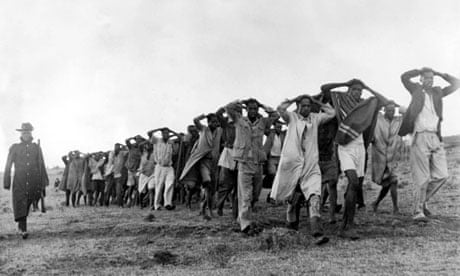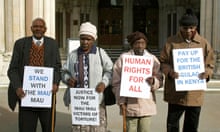The full story of the British government's attempts to mount a cover-up following a massacre of unarmed prisoners during the 1950s Mau Mau insurgency in Kenya has been disclosed with the declassification of hitherto secret files from the era.
The documents - held for five decades in a secret Foreign Office archive - show that ministers and officials were claiming that the men had died after drinking contaminated water long after they had been informed of the truth: that all 11 had been been beaten to death.
They were also aware that the deaths at Hola prison camp in the south east of the country resulted from a programme of systematic abuse that prison guards had been authorised to inflict on Mau Mau prisoners in an attempt to break their will and force them to submit to authority of the colonial government.
The files, now available to the public at the National Archives at Kew, south west London, are among the latest batch to be transferred after the foreign office acknowledged the existence of its secret archive, during litigation brought on behalf of Mau Mau veterans at the high court in London.
Among the files are a series of exchanges between Sir Evelyn Baring, governor of Kenya, and Alan Lennox-Boyd, secretary of state for the colonies, in March 1959. In the first, sent the day after the massacre, Baring stated that the men had died "after they had drunk water from a water cart". He added that although some of the dead "were suffering from slight bruises" following a scuffle, "there is not the slightest indication that that any force used had any connection with any of the deaths". A press release to this effect was then published in Nairobi.
In fact, prison officers and guards had been authorised to beat Mau Mau detainees if they refused to carry out work at the country's prison camps, with the colony's attorney general, Eric Griffith-Jones, rewriting local law in order to decrimininalise such assaults. Documents transferred to Kew from the secret archive earlier this year show that this redrafting was done in secret, with Griffith-Jones warning Baring: "If we are going to sin, we must sin quietly."
Another document made public shows that more than a week after being informed that post-mortem examinations had shown that the men had been beaten to death - with some suffering fractured skulls and jaws, and several dying from organ failure brought on by shock - Lennox-Boyd planned to deploy the "water cart" cover-up while facing questions in the House of Commons from Barbara Castle, the Labour MP who was campaigning for an end to the mistreatment of Mau Mau prisoners.
"We fully recognise there can be no legal liability upon you but public opinion is extremely sensitive on Hola problem, and Kenya government are widely regarded rightly or wrongly as under a moral obligation for the deaths," Lennox-Boyd wrote to Baring. "We could I fear maintain a rigid stand on the legal rights and wrongs at best only at the cost of a great deal of bitter and unnecessary political trouble here. I am sure you will agree we should try to let this unhappy incident drop out of sight as soon as possible. If a 'niggardly' attitude is taken this will be impossible".
Baring advised Lennox-Boyd to avoid the water cart claim, and suggested he should simply evade the question on the grounds that it would be "inappropriate" to anticipate the outcome of an inquest.
The colonial authorities then decided that they should scour their files for evidence that the dead men were criminals. When it was discovered that none of them had been convicted of committing any criminal offence, and had been held without trial because of their support for the insurgency, Baring instructed that "an exercise should be done on the dossiers" in order provide some useful material. He also suggested that they should secure an opinion that the dead men may have been more susceptible to injuries as a result of suffering scurvy.
When the inquest was held, witnesses described how the men had been sitting down, refusing to dig an irrigation ditch, when the guards began beating them with clubs. The prison's superintendent, Michael Sullivan, and his deputy, Walter Coutts, had been present. When called to give evidence, Coutts attempted to tell the magistrate who was presiding over the inquest that the 11 men had "willed themselves to death".
The magistrate concluded that the men had been beaten to death, but that the question of criminal charges was a matter for the attorney general, Griffith-Jones - the official who had altered the law in order to permit the beatings. Griffith-Jones concluded that nobody should be prosecuted, as it was impossible to ascertain which guards had inflicted which blows.
The secret archive was held at Hanslope Park, north of London, and acknowledged only once historians employed by lawyers representing the Mau Mau veterans realised that some documents from the era were being withheld. One of those claimants, Wambuga Wa Nyingi, was among the prisoners who survived the beating at Hola.
the Hanslop Park archives holds late-colonial files from many other parts of the world. However, many of the most damning documents were destroyed on the instructions of ministers.



